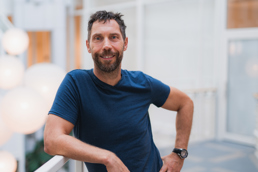Why we empower the authoritarian leader in times of fear
-
Sist oppdatert
10. juni 2025
-
Kategori
Strong leaders are often seen as confident, decisive, and bold. They act when others can’t. But they must also be held accountable.
SCIENCE NEWS FROM KRISTIANIA: Leadership
Summary:
- In chaos and crises, people tend to give more power to strong leaders who promise control, often without asking questions.
- Professor Tom Karp warns that unlimited power in the hands of a leader undermines democracy.
- In the workplace, as well as in politics, leaders who go unchecked can threaten institutions, workers' rights, and the balance of power.
- Strength without accountability is dangerous, argues Karp. When leaders are not held accountable, workplaces and society may suffer serious and lasting harm.
(This summary was generated by AI and quality-assured by the editorial team).
We often turn to strong leadership in times of uncertainty, chaos and crisis. The philosopher Thomas Hobbes pointed this out as early as the 1600s. Living in a time of conflict, he believed that only a strong state, led by strong leaders, could hold society together. His ideas can’t be scientifically proven, but they have helped shape a lasting belief in strong leadership.
These days, strong leaders are thriving. The U.S. president sees himself - despite his egotism, childishness, and bullying behaviour - as a strong leader. And he prefers the company of others like him. When leaders like him team up with tech billionaires obsessed with corporate-style leadership, it’s time to buckle up.
In times of disorder, people in general seem to be more willing to hand over power
In the background, the manosphere is lurking. It glorifies masculinity, self-discipline, mental and physical toughness.
Add a growing fan base for Ayn Rand’s controversial novel, Atlas Shrugged, and a pattern starts to emerge.

Read more:
Strong leadership can also be destructive
Many strong leaders want the power to act without interference. Take Trump, for example. He tries to dethrone anyone who challenges him: the media, the courts, even public institutions.
In times of disorder, people in general seem to be more willing to hand over power. We want someone to take control. To lead us through the storm.
But we don’t always stop to question how that power is being used.
Strong leaders who crave control often distrust transparency and democratic processes, as these processes slow things down and limit the freedom to act.
Strong leadership is, of course, not always a bad thing. Yet some of the very traits that make leaders appear strong, like aggression, egocentrism and narcissism, can also be deeply destructive.
Employee participation is heading in the wrong direction
We are an ocean away from the U.S., and Norwegian society is very different. Still, we need to be mindful of admiring leaders who are given too much power and unlimited manouvring space.
In my latest book, Lederisme, I argue that society has shifted in ways that benefit leaders. Over the past 30 to 40 years, the leadership profession has gained more economic, cultural, social, and symbolic power.
Set geopolitics aside, and we’ll see that when faced with unlimited leadership power, Norwegian workplace democracy is unlikely to escape without lasting harm
When leaders are given too much freedom to act, cracks begin to show in the democratic Norwegian labour model. A gradual shift is occurring - tilting the balance from employees to employers. Studies show a steady erosion of employees’ rights to participate and influence decisions.
Unlimited leadership is risky
Strong leaders with no checks and balances threaten social contracts, institutions and established principles. That is the reality European leaders are now painfully learning, as they see long-standing structures being dismantled. In these cases, democratic ideals do not help. Only the hard truths of power politics apply. They must mobilise alternatives to unchecked power faster than they are able to. Set geopolitics aside, and we’ll see that when faced with unlimited leadership power, Norwegian workplace democracy is unlikely to escape without lasting harm.
The question is, how suitable is labour democracy for handling contemporary challenges in the workplace? The answer to that question remains open. But the solution is certainly not to give leaders who are loyal only to their principles and themselves unlimited power and freedom to act.
Being decisive and action-oriented are valuable leadership traits. But only when paired with accountability.
Otherwise, if strong leaders with unchecked power – fuelled by global trends and blind admiration for strength – are given too much room, the working life in this country could face serious consequences.
Text: Tom Karp, professor, School of Communication, Leadership and Marketing, Kristiania University of Applied Sciences.
This article was first published in the Norwegian edition of Dagens Næringsliv on the 28th of February 2025 under the title “Sterke ledere er i vinden”.
We love hearing from you!
Send your comments and questions regarding this article by e-mail to kunnskap@kristiania.no.
Siste nytt fra Kunnskap Kristiania
 Kunnskap KristianiaLes mer
Kunnskap KristianiaLes merVerdien av stillhet
Vi lever i en tid der hvert øyeblikk kan fylles – av lyd, informasjon, samtaler, varsler og tanker. Kunnskap KristianiaLes mer
Kunnskap KristianiaLes merFrykten for å gå glipp av noe skaper uro – og mer scrolling
Problemet med sosiale medier er ikke at de fører til sosial isolasjon. Men FOMO-syndromet skaper stress. Kunnskap KristianiaLes mer
Kunnskap KristianiaLes merNår Tinder møter hverdagslogistikken
Du syntes det var vanskelig å få datingapper til å fungere? Prøv å få det til med hverdagslogistikken til en aleneforelder. Kunnskap KristianiaLes mer
Kunnskap KristianiaLes merHva om du kunne «gå opp i level» underveis i prøven?
I dataspill får du en ny utfordring i det øyeblikket du er klar for den.

Meld deg på vårt nyhetsbrev




